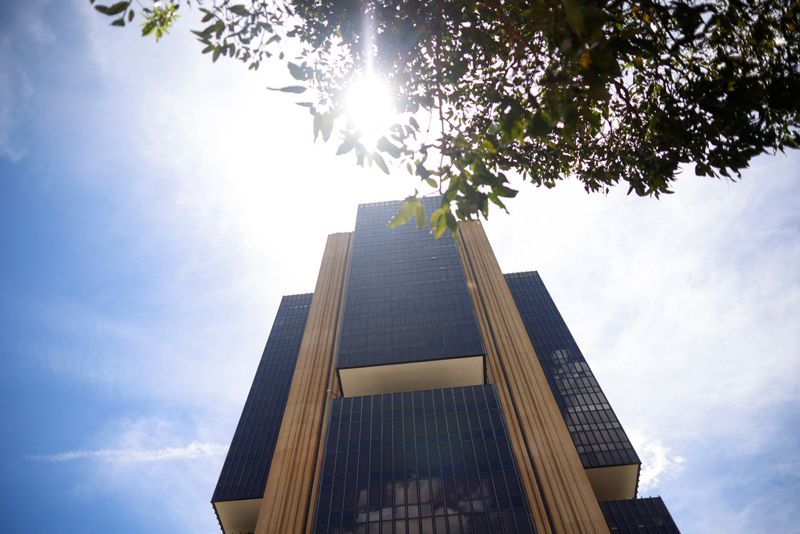By Luana Maria Benedito and Gabriel Burin
SAO PAULO/BUENOS AIRES (Reuters) - Brazil's central bank will cut its key rate by 50 basis points next week for the fifth time in a row, a Reuters poll showed, but may also give slightly more restrictive guidance, with an eye on some worrying inflation and fiscal trends.
The bank's rate-setting committee, known as Copom, has already reduced the cost of credit by a cumulative 200 basis points to 11.75% since August from a six-year high of 13.75%, as inflation fell back to single digits, ending 2023 at 4.6%.
However, the outlook for further cuts this year is becoming less clear with inflation expectations remaining above the center of the official target amid a political tug of war over fiscal adjustment plans.
Copom is set to lower the Selic rate by another half-percentage point at its Jan. 31 meeting to 11.25%, said all 44 economists surveyed over Jan. 21-25. It would be the first of two 50 basis point cuts policymakers have all but guaranteed for 2024.
Citibank analysts expect 50 basis point cuts at each meeting throughout the first half of this year, starting on Jan. 31, with a final 25 basis point cut in June to 10.0%.
They wrote in a note that "the tight labor market, the stickier inflation, worse fiscal fundaments, and the less friendly international environment point to a higher-than-pre-pandemic rate at the end of the cycle."
The Selic rate stood at 6.50% for a long period before the central bank began an easing cycle in 2019.
Of particular concern to policymakers is persisting forecasts of a potential rise in consumer prices across the foreseeable horizon above 3.0%, the center of the central bank's target, which has a margin of plus or minus 1.5 percentage points.
Brazil will likely see an average inflation rate of 3.8% this year, dropping only slightly to 3.6% in 2025 and 3.5% in 2026, according to a separate Reuters poll compiled earlier this month.
Laiz Carvalho, Brazil economist for BNP Paribas (OTC:BNPQY), said the central bank's statement on next week's decision should mention "the importance of staying patient...and also inflation expectations that are still above target."
This in turn stems from a worsening fiscal picture, acknowledged more recently in a report by a federal audit body that forecast a primary budget shortfall in 2024, contradicting the government's "zero deficit" promise.

Another factor on the bank's radar is the prospect of less easing in the United States this year than markets now expect, as the U.S. Federal Reserve will probably wait until the second quarter before cutting rates.
"The movement towards global rate easing could be affected if external conditions worsen, and, consequently, domestic monetary policy could be affected as well," said Yuri Alves, an economist at Guide Investimentos.
(Reporting and polling by Gabriel Burin in Buenos Aires and Luana Benedito in Sao Paulo; Editing by Ross Finley, Kirsten Donovan)